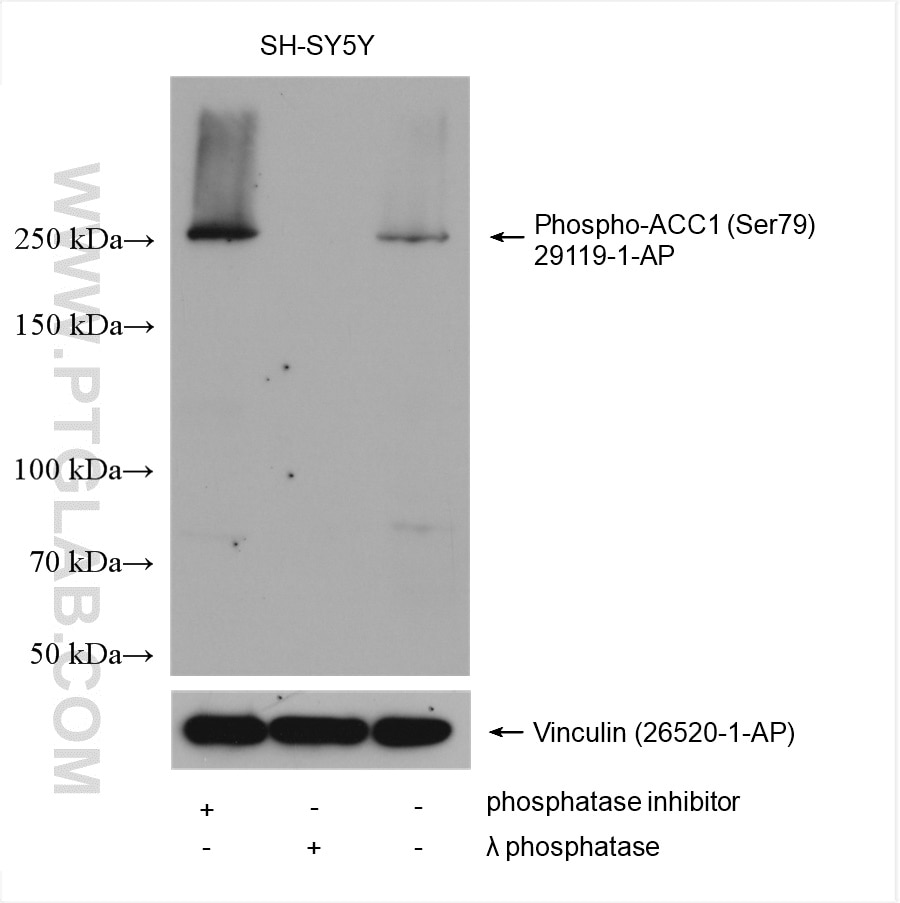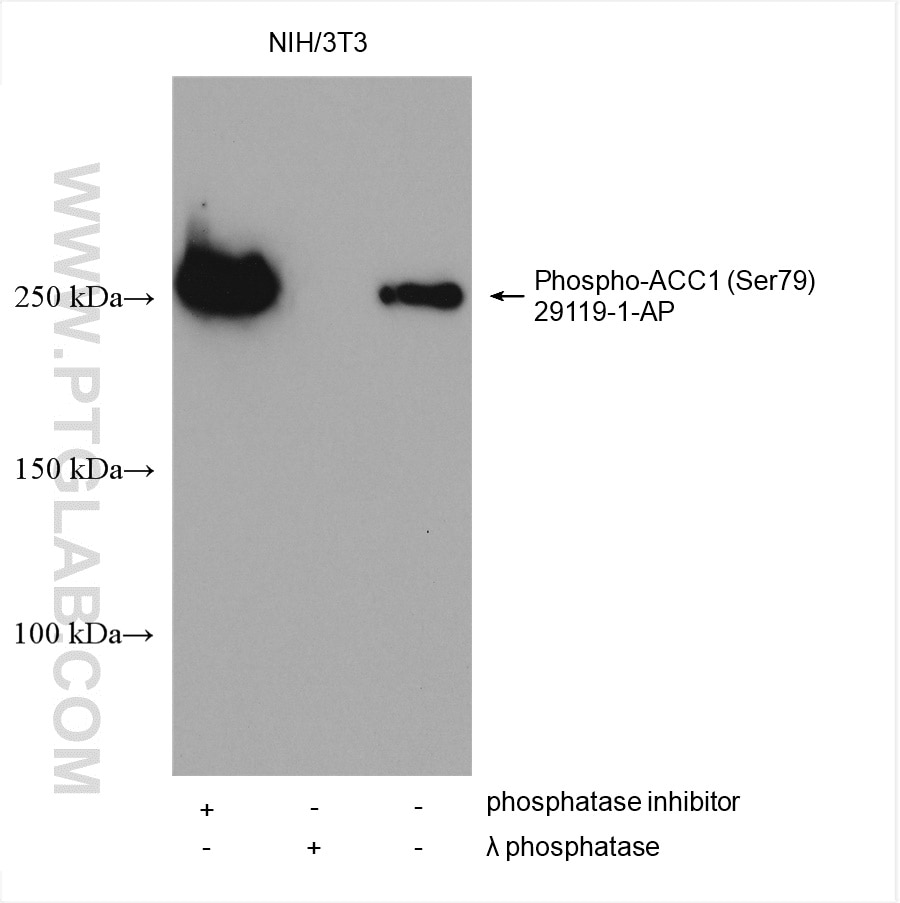Anticorps Polyclonal de lapin anti-Phospho-ACC1 (Ser79)
Phospho-ACC1 (Ser79) Polyclonal Antibody for WB, ELISA
Hôte / Isotype
Lapin / IgG
Réactivité testée
Humain, rat, souris
Applications
WB, IHC, ELISA
Conjugaison
Non conjugué
N° de cat : 29119-1-AP
Synonymes
Galerie de données de validation
Applications testées
| Résultats positifs en WB | cellules SH-SY5Y traitées à la λ phosphatase, cellules NIH/3T3 traitées à la λ phosphatase |
Dilution recommandée
| Application | Dilution |
|---|---|
| Western Blot (WB) | WB : 1:500-1:2000 |
| It is recommended that this reagent should be titrated in each testing system to obtain optimal results. | |
| Sample-dependent, check data in validation data gallery | |
Applications publiées
| WB | See 24 publications below |
| IHC | See 2 publications below |
Informations sur le produit
29119-1-AP cible Phospho-ACC1 (Ser79) dans les applications de WB, IHC, ELISA et montre une réactivité avec des échantillons Humain, rat, souris
| Réactivité | Humain, rat, souris |
| Réactivité citée | rat, Humain, souris |
| Hôte / Isotype | Lapin / IgG |
| Clonalité | Polyclonal |
| Type | Anticorps |
| Immunogène | Peptide |
| Nom complet | acetyl-Coenzyme A carboxylase alpha |
| Masse moléculaire calculée | 2383 aa, 275 kDa |
| Poids moléculaire observé | 250 kDa |
| Numéro d’acquisition GenBank | BC137287 |
| Symbole du gène | Acetyl-CoA Carboxylase 1 |
| Identification du gène (NCBI) | 31 |
| Conjugaison | Non conjugué |
| Forme | Liquide |
| Méthode de purification | Purification par affinité contre l'antigène |
| Tampon de stockage | PBS with 0.02% sodium azide and 50% glycerol |
| Conditions de stockage | Stocker à -20°C. Stable pendant un an après l'expédition. L'aliquotage n'est pas nécessaire pour le stockage à -20oC Les 20ul contiennent 0,1% de BSA. |
Informations générales
ACC1 represents a key enzyme, as it is highly regulated by phosphorylation and allosteric regulation, providing a rapid adaptation to new micro-environmental conditions. AMPK phosphorylates acetyl CoA carboxylase (ACC), a rate-controlling step in the conversion of acetyl-CoA to malonyl CoA. This phosphorylation inhibits the activity of ACC, which results in decreased malonyl CoA levels. Additionally, two isoforms of ACC encoded by two different genes in mammalian cells have been described, ACC1 and ACC2. ACC1 is highly enriched in lipogenic tissues (liver and adipose), while ACC2 is mainly expressed in oxidative tissues (heart, skeletal muscle and liver). (PMID: 29056512, PMID: 16054041, PMID: 30816537)
Protocole
| Product Specific Protocols | |
|---|---|
| WB protocol for Phospho-ACC1 (Ser79) antibody 29119-1-AP | Download protocol |
| Standard Protocols | |
|---|---|
| Click here to view our Standard Protocols |
Publications
| Species | Application | Title |
|---|---|---|
Signal Transduct Target Ther The AKAP12-PKA axis regulates lipid homeostasis during alcohol-associated liver disease | ||
Autophagy Periplocin suppresses the growth of colorectal cancer cells by triggering LGALS3 (galectin 3)-mediated lysophagy | ||
Free Radic Biol Med The opposite role of lactate dehydrogenase a (LDHA) in cervical cancer under energy stress conditions | ||
J Ethnopharmacol Ferulic acid from Angelica sinensis (Oliv.) Diels ameliorates lipid metabolism in alcoholic liver disease via AMPK/ACC and PI3K/AKT pathways | ||
Food Funct Hawk tea prevents high-fat diet-induced obesity in mice by activating the AMPK/ACC/SREBP1c signaling pathways and regulating the gut microbiota. | ||
Front Cardiovasc Med MCC950, a Selective NLRP3 Inhibitor, Attenuates Adverse Cardiac Remodeling Following Heart Failure Through Improving the Cardiometabolic Dysfunction in Obese Mice. |



